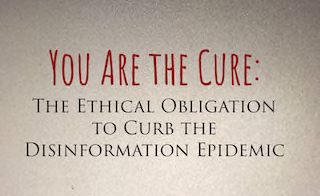Growth
You Are the Cure:
The Ethical Obligation to Curb the Disinformation Epidemic

I’m writing these thoughts just after midnight on January 10, 2021, four days after the Capitol Riot in Washington, D.C. While the contributing factors that got us here are complex, one of the greatest contributing factors is the vast stream of misleading information that is thrust upon us every day.
Disinformation in the media has always existed, and in the technological age, the barrier to entry is lower than ever for disseminating information world-wide. Anyone can write a social media post, start a blog, or post a YouTube video, and cable news networks and niche news sources are everywhere.
Both sides of the political aisle regularly claim that the other side’s information is false, biased, and flawed, and in my conversations about fake news with acquaintances, friends, and loved ones, I often hear, “It’s impossible to know what’s true anymore” or “I don’t have time to do all that fact-checking.”
These sentiments are 100% valid.
It’s unfair to expect that the typical person, after a long day of work and taking care of their family, would have the time, mental energy, or attention span to dig into an article, gather credentials on the author, investigate cited sources, develop the necessary skills to analyze presented data, and consider conflicts of interest that may influence what the author has written.
At some point, though, people need to take some responsibility, do their homework, and verify the information they’re consuming or at the very least, not be part of the problem by spreading manipulative, reckless untruths.
So....what are we supposed to do?
What is the individual’s obligation as a consumer of information and media in our democracy?
How should one consume and share information in an ethical way?
Now that each person has a public platform on the internet, is it unethical or amoral to share unverified information, even when it seems to align with one’s beliefs and values?
As it is with so many other complicated situations, all the individual can do is manage their own actions.
Here are three ways each person can take responsibility, reject helplessness, and help mitigate the epidemic of disinformation:
1) Stay conscious about which direction a source may slant on its bias. Media is always biased in one way or another, and to be aware of that is helpful. While these resources may not be “perfect,” you can do a very quick search to find the known bias of your chosen media source:
2) In our free country, the individual does not necessarily need to change their media consumption habits, but it would help a lot if we all demand more integrity from our news sources and consume information from organizations that are known for their transparency and high ethical standards.
3) Pledge to share information in an ethical way. If the individual cannot personally verify information or parse what is opinion from what is claimed as fact, it is amoral and unethical share it.
When we make the wrong choice, and share virulent material, it’s simply gossiping on a societal level. By now it should be obvious that the stakes are very real and very serious when we do this.
This toxic gossip tarnishes our personal honor and puts our democracy at grave risk. We’ve seen that it’s harmful to our families, friends, and communities when we spread disinformation, and many of us are responsible for the damage. Disinformation is out there, but we don’t have to be part of the problem by spreading it.
In a country where so many people responsibly arm themselves for self-defense, practice gun safety, and hone shooting fundamentals, I wonder why more people don’t also work to arm themselves with the basic methods of questioning and verifying the information they consume.
Knowledge is power, and disinformation is dangerous. Spreading flawed or false information is like waving around a loaded gun with the safety off or looking down the barrel to see if it’s loaded.
Information sharing should be handled with the same gravitas as handling a loaded weapon because we know that information is often weaponized against us. If we can’t properly handle the tool, we should at least be responsible enough not to pick it up and harm ourselves, others, or the foundations of our democracy with our recklessness.
Have some time and energy to become a better-informed citizen?
Want to learn more about how to verify the validity of media?
Watch this short video by the James Cook University Library in Queensland, Australia.
Or visit this website by educator John Spencer.
Don’t have time or energy to check your sources?
Here’s a time-saving tip: It takes ZERO SECONDS not to share unverified news.
by KaDee Bramlett
published 01/10/2021
This is an ad-free space. If you'd like to contribute to help me continue creating this content, I accept contributions on Venmo @KaDee-Bramlett. Thank you!